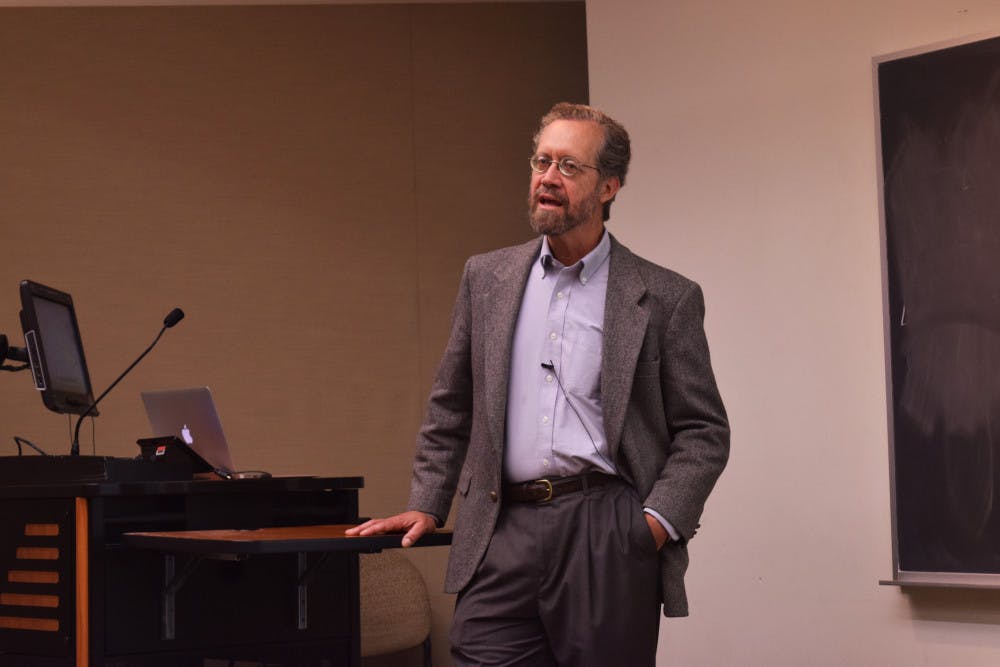Scott Shane, a national security reporter for the New York Times, spoke Friday on the killing of Anwar al-Awlaki, the ethics behind drone strikes and the war on terrorism in the United States.
The talk was followed by a signing of Shane’s recent book “Objective Troy: A Terrorist, A President, and the Rise of the Drone.”
Shane highlighted the influence and Internet following of Awlaki, the first American citizen killed without trial by the U.S. government since the Civil War. Awlaki spent much of his time making videos about Islam, one of which called for jihad against the United States. He was placed on President Barack Obama’s kill list in April 2010 and killed by a drone strike in September 2011.
But Awlaki’s influence seems to have spread even further since the United States killed him, Shane said. Shane questioned the “efficacy” of the killing, arguing that because of his immense Internet presence, Awlaki was celebrated as a martyr after his death.
“More than half of all the people who have been arrested in the four years since his death in the United States on terrorism charges … if you look back in the history of their laptop, you’ll find lots of Awlaki videos,” Shane said, adding that the Boston Marathon bombers in 2013 were huge fans of Awlaki and learned how to make the pressure cooker bombs from Awlaki’s English-language magazine “Inspire.”
Osama bin Laden’s death in May 2011 and Awlaki’s subsequent killing prompted a string of other much less successful assassination attempts, Shane said. “The Obama White House kind of felt like they were on a roll,” he said.
Two weeks after Awlaki’s death, the United States launched another drone strike to kill a mid-level al Qaeda operative but ended up killing a total of seven people — none of whom were the target, Shane said. Among those killed was Awlaki’s son.
Many Yemenis were “extremely upset at the idea of an innocent teenager being killed, and it made a much bigger impression,” Shane said.
Halle Vernon ’19 raised the question of whether there are measures to increase accountability for the killing of innocent people by drones. Shane said in response that the main problem is that the government has never been required to publish information about the number of drone strikes it orders. In addition, an ongoing argument within government administrations is that “drones have a lower rate of civilian deaths and collateral damage than many conventional techniques” that were employed in big wars like the Vietnam War, he said.
Shane told The Herald after the lecture that prior to leaving for Yemen, he corresponded with Awlaki’s younger brother, who currently serves as the deputy minister of water and the environment in Yemen. He offered Shane security during his trip.
“Ironically, I hired the terrorist’s brother to provide me security” because of the dangers of kidnapping, Shane told The Herald. Though Shane managed to personally speak to Awlaki’s family members, it was too dangerous to go to the place where Awlaki and his son were killed, he said.
While he left the country with many “unanswered questions,” Shane found the whole process of researching and reporting in Yemen “gratifying,” he told The Herald.
The talk was co-sponsored by Brown Amnesty International and the Brown Journal of World Affairs.
Sadhana Bala ’18, co-president of Brown Amnesty International, said many of the group’s meetings have focused on the debates surrounding violations of human rights, so the group was keen on bringing in an expert to speak to Brown students about a specific case.
“Amnesty does a lot of work on human rights, and I think a neglected area is the ethics behind drone strikes in the Middle East,” said Mili Mitra ’18, the other co-president of Brown Amnesty International and a Herald opinions columnist.
Shane has been writing about Awlaki since 2009. He began writing his book in late 2013, and it was published in September.





